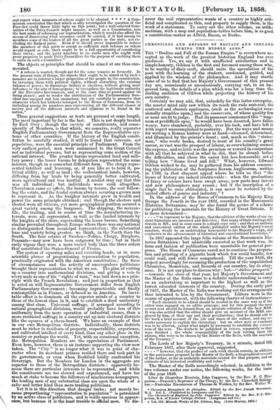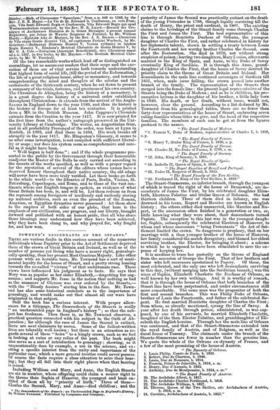CHRONICLES AND RECORDS OF BRITAIN AND IRELAND DURING THE MIDDLE
AGES.* THE "Decline and Fall of the Roman Empire" is everywhere ac- cepted as the work of the greatest historian England has ever produced. Yes, we say it with unaffected satisfaction and in simple honesty, Gibbon is the first and foremost among those who, to be worthy of their craft, should unite the speculation of the poet with the learning of the student, condensed, guided, and applied by the wisdom of the philosopher. And it may startle some of us to find that her Majesty's Government of this present day are, consciously or unconsciously, carrying out, in an im- proved form, the details of a plan which was for a long time the darling ambition of Gibbon while projecting the history of his own country.
Certainly we may add, that, unluckily for this latter enterprise, the master mind only saw within its reach the rude material, the scattered and obscure appliances, (such as the archmologist occa- sionally stumbles upon,) and the conservata, of whose quality few or none are fit to judge. Had its possessor commenced this " mag- num et perdifficile opus," he would have been daunted, have fallen weary, have slumbered, probably, over his task, and have left it with regret unaccomplished to posterity. But the ways and means for writing a Roman history were at hand—cleansed, determined, and illumined by the printer's fount ; and, much as this "states- man," who wrote books, desired to treat of his country's great career, so vast was the prospect of labour, so overwhelming seemed the expense, and so little was the premium or reward in comparison with all that he achieved in what he did, that he shrank before the difficulties, and chose the easier but less honourable art of telling how "Rome lived and fell." What, however, Edward Gibbon wished to do, may be gathered from his address concern- ing the publication of the Scriptores Rerura Anglicarum, written in '1793, in that eloquent appeal where he tells us that " the losses of history are indeed irretrievable : when the productions of fancy or science have been swept away, new poets may invent and new philosophers may reason ; but if the inscription of a single fact be once obliterated, it can never be restored by the united efforts of genius and industry." t In the address of the House of Commons to his Majesty King George the Fourth in the year 1822, recorded in the Monuments Histories Britannica, may be also found the germs of a scheme for publishing the materials for the Histdry of Great Britain. It is there determined-
- - - - "to represent to his Majesty, that the editions of the works of our an- cient historians are incorrect and defective ; that many of their writings still remain in MS., and in some cases in a single copy only ; and that an uniform and convenient edition of the whole, published under his Majesty's royal sanction, would be an undertaking honourable to his Majesty's reign, and conducive to the advancement of historical and constitutional knowledge."
In 1837 appeared the large folio volume of the Morrumenta His- torica Britannica: but admirably executed as that work was, its form and fashion of publication were unsuitable for general pur- poses. The House of Commons cared not to continue the prepara- tion and printing of a gigantic book which few could handle, few could read, and still fewer comprehend. Till the year 1856, the project accordingly for resuming the production of the unpublished Chronicles, Memorials, and Records of our country, lay in abey; ance. It is not our place to discuss why ; but—" diebus prosperis —towards the close of that year, her Majesty's Government and the Master of the Rolls came to a definite understanding to carry on an undertaking so important to the highest as well as the lowest educated interests of the conntry. During the early part of 1857, the Master of the Rolls was working out the arrangements thus intrusted to him by the Government. Editors were in the course of appointment, with the following charter of instructions- " Each chronicle to be edited should be treated in.the same way, as if the editor were engaged on an editio princeps; and for this purpose the most correct text should be formed from an accurate collation of the beat MSS. It was also settled that the editor should give an account of the MSS. em- ployed by him, of their age and their peculiarities ; that he should add to the work a brief account of the life and times of the author, and any re- marks necessary to explain the chronology : but no other note or comment was to be allowed, except what might be necessary to establish the correct- ness of the text. The works to be published in octavo, separately as they were finished ; the whole responsibility of the task resting upon the editors, who were to be chosen by the Master of the Rolls, with the sanction of the Treasury." The Lords of her Majesty's Treasury, in a minute, dated 9th. February 1857, after their approval,_ suggested, - - - - " however, that the preface of each work should contain, in addition to the particulars proposed by the Master of the Rolls, a biographical account of the author, so far as authentic materials existed for that purpose, and an estimate of his historical credibility and value."
The Master of the Rolls accordingly selected, in addition to the two volumes under our notice, the following works, for the issue of the year 1858.
Liber de illustribus Henricis, John Capgrave, Walden, by the Rev. F. C. Hill-
geston.—Peaeock's Repressor of the Clergy,, Ir• the Rev. Churchill Babing- ton.—Fasiculus Zizamorum of Thomas de alden, by the Rev. Walter W.
* Chronie,on Monasterii de Abingdon. Edited by the Rev. Joseph Stevenson, M.A. Vol. I. (Published by Longmans and Co.) The Chronicle of England, by John Capgrare. Edited by the Rev. F. C. Ilin- geston, B.A. of Exeter College, Oxford. (Longmans and Co.)
$ Vol. III. Mina. Works of Ed. Gibbon, Esq. (John Murray,1814.) ,Shirley.-Rich. of Cirencester " Srculum," from A.D. 449 to 1348, by the Rev. J. E. B. Mayor.-La Vie de ht. Edouard le Confesseur, en vers Fran- cois, Vita beati Edwardi Regis et Confessoris, Vita Edwardi Regis qui apud Westmonasterium requieseit, by the Rev. H. R. Luard.-Recueil des Cro- niques et Anchienues Histoires de la Grant Bretaigne a present nomme Engleterre par Jehan de Waurin Sei"neur de Forestal, by Mr. William Hardy.-Epistolas Ada de Marisco, by the Rev. J. S. Brewer.-Chronicon de Vita atque Gestis Henrici VII, ad eaptionem Perkini Warbeck, by Mr. Gairdner.-Redmanni Historia Henrici V, Versus rythmici in laudem Regis Henrici V, Elmham's Metrical Chronicle de Gestis Henrici V, by Mr. C. A. Cole.-Eulogium (Anonymi Benedictini), sive Chronicon usque ad A.D. 1367, in five book 'Ft by Mr. Haydon.-The Scottish Metrical Chro- nicle by Mr. W. Turnbull.
Of the two remarkable works which lead off so distinguished an assemblage, let us assure our readers that their scope and the exe- cution of them are of vital service both towards understanding that highest form of social life, (till the period of the Reformation,) the life of a great religious house, abbey or monastery, and towards
• comprehending the mind and thoughts of the scholar and the ecclesiastic of the thirteenth century, when he sat down to present a summary of the trials, fortunes, and greatness of his own country. The Chronicon de Abingdon, being the history of a monastery, is in a great degree the history of a universal order established throughout Christendom : it extends from the arrival of the Anglo- Saxons in England down to the year 1189, and thus its history is the history of Europe for at least ten centuries. It is printed from a MS. in the British Museum. John Capgrave's Chronicle extends from the Creation to the year 1417. It is now printed for the first time from the author's autograph preserved in the Uni- versity Library at Cambridge. The writer, an Augustinian friar, and in all probability Provençal of the order, was born at Lynn in Norfolk, in 1393, and died there in 1464. His work breaks off abruptly in the year 1417. Mr. Hingeston's Glossary, it seems to us after some investigation, is not compiled with sufficient liberal- ity or scope • nor does his system seem so comprehensive and care- ful as it might have been.
" Well begun is half done" ; and if the whole programme pre- sented to the public by the Government. through their honourable coadjutor the Master of the Rolls be only carried out according to the deserts of the works specified, as well as with a proper regard for the reputation of several of the editors whose names have a deserved honour throughout their native country, the old adage will never, have been more truly verified. Let these books go forth to the whole world-to the libraries of Paris, Berlin, Vienna, St. Petersburg, Copenhagen and Rome, and to those of the vast con- tinents where our Engli;h tongue is spoken, as evidence of what Great Britain has been, is, and will be. Let them redeem us from the reproach among foreigners of needlessly and uselessly storing ,up national archives, such as even the proudest of the Roman, Assyrian, or Egyptian dynasties never possessed : let them show to the empires of both sides of our globe, that here is the emphasis of our civilization, our progress, and our liberty, brought forward and published with an honest pride, that all who share those blessings may understand how they have been achieved, why they have been clung to, and why prayed for, why fought for, and how won.



























 Previous page
Previous page